#script analysis
Explore tagged Tumblr posts
Text
Sydcarmy vs Clairecarmy shot type, script, and relationship differences.
I was watching some clips I had for an edit I was working on and then I realized some interesting things about the shot sizes and types used In Carmen's interactions with Claire and Sydney, and the differences between u which can be argued to further push the Sydcarmy agenda. So... Let me cook.
Claire and Carmy
Their INFAMOUS close up shots are often talked about among the fandom. These scenes are often viewed as imposing, absorbing, intrusive and sharp. This shot type is often in their scenes together after medium double shots or over the shoulder shots.
Their initial meeting is quick-cut to these close ups, mirroring how their relationship and connection is brought about. A simple accidental meeting (alternating single medium shots) straight- almost immediately - to these really intense close-ups that, even to people who don't like to analyze these things, felt really affected by.
The cinematography regarding their connection is quick to be close, some would even say too close, and I believe this is meant to reflect their exact relationship.
Let's discuss their "intimate" or "cute" scene at the party in season 2 episode 5. (I cut off the rest of their dialogue because I wanted to discuss/analyze the shot and cinematography choices mostly
- slow push in during initial dialogue about Carmens fake party persona, Logan. (Whom @yannaryartside has discussed EXTENSIVELY and always eats about so I won't go too deep about that just yet but check 'em out.)
- cut-to close up after Carmen attempts to make a genuine observation about Claire's character.
What's the effect?
The initial choice to start this scene off with a slow push into their dialogue gives a personal, real feel. Like you're really there at the party. This makes sense with their topic of discussion at the time, Carmen going along with this fake persona he's adopted at this party.
Then, Carmy changes the subject, trying to make a 'genuine' observation about who Claire is, who he thinks he is.
Carm: "With Kelly, you're really good at that."
Claire: "good at what?"
Carm: "uh... Listening"
But let's think about that observation real quick, it was pretty much fed to him, just like everything else he has ever known about Claire. He sees the image of her his family laid out of her, and now he's seeing this image of a caretaker and listener that she has put out for him. Or, rather, literally made a whole outing with him about, basically saying "lets go to a party so you can watch me comfort my sad friend."
I digress, paired with this dialogue, the slow push in is intentional, to set that kind of real connection and build up a good relationship would have. But then...
Cut to a close up of Claire at his observation. She goes on further to tell him about how in college she was the one that everyone went to and that she would take care of when intoxicated. Not only does this jump straight into the image that's been created and upheld by others of Claire for Carmy, but it also skips a good chunk of the way they could have gotten there from continuing its slow push in. The cut to Claire’s close-up feels like it’s reinforcing the manufactured, performative aspect of her persona. She’s always already presenting an image of herself and the one that Carmy’s been fed by others, and now he's seeing her perform it for him. There’s no real room for them to discover who each other truly are beneath the surface. They get pushed(heh) into that “perfect” intimacy too quickly, (hence the ungodly amount of close ups) and everything gets rushed and artificial. The choice to make their interaction so loose and slow and intentional, to tight and suffocating, cutting to close-ups where Claire is the one “listening” or “comforting,” reinforces how his perception of her has been shaped by external factors rather than his own emotional processing. (Also, kinda wanna talk about how in the clip above you hear the inflection of Carmy's line when he says "listening" goes up, sort of sounding like a question. Does he really know if she's good at listening or is that just what he's been told? Is that just what he's been shown? It sounds like he's questioning whether she is really a good listener or not)
The nature of Clairecarmy cinematography is supposed to be rushed, invading and almost immature, just like them.
As opposed to
Sydney and Carmy
For Sydcarmy, we'll talk about The Table Scene (cue the "oh brother"'s) - sorry I had to speed it up it's a VERY LONG SLOW PUSH
The table scene features a (very) long push-in on Carms and Sydney's interaction under the table with no cuts or major changes in their positions. This scene is often seen as one of the most intimate within this show. It's a real intimacy, as opposed to the contrived "intimacy" we see in clips of Claire and Carmy, where even their dialogue doesn't serve their connection and deepening it as much as the shot types they get do.
Let's discuss the differences between the table scene and the party scene.
That table scene is a chef’s kiss example for tension* in cinematography.
*fun, emotional, and genuine tension, maybe even sexual and romantic, but not malicious
The slow push-in during the Sydney and Carmy's conversation is such a stark contrast to the Claire-Carmy moments. Where Claire and Carmy’s shots are invasive and rushed, Sydney and Carmy’s are carefully measured, building that slow tension that just eats at you. Which is deliberate, of course, as everything with this show is. (Also remember how I brought up the questioning infliction in Carmy's 'observation' he made about Claire? Here, he makes a standing observation about Sydney without any unknowingness. "You like taking care of people." It's resounding. It's real. It's not contrived intimacy, it's natural.)
It's a direct contrast to any scenes of "intimacy" between Carmen and Claire. Just thinking about any scene of them together, there are quick cuts, quick close-ups and shot types that read intimacy parked with dialogue that... Doesn't.
Sydney and Carmy's scenes usually feature these slow push in's, but especially so for the table scene. Just like mentioned with the previous scene, this is supposed to be a reflection of their connection and relationship.
There's a lot of distance in the beginning, a slow, slow push in is like their slow connection building. Not only is this deliberate to bring us as the viewers closer to them, but to bring these characters closer together as well. These cinematography choices are made along with dialogue that is actually intimate rather than cheaply contrived to trick the viewer into believing it is real intimacy (like with almost every Claire and Carmy scene)
Then, there's a still moment in the middle of the push inwards, around when the wide shot becomes a medium. This may be supposed to signify that for them to grow closer, there will be some resistance to face there. Stagnation. This period could possibly be equivalent to season three? That was Carmen's stagnant and regressive state where he began to relive and react his traumas, making Sydney step back. In this moment as the shot stills Carmen's eyes are on Sydney. Just as he always keeps an eye on her. Reminds me of something from season three...

Then the still is broken and we get more of a push in, into an almost close-up, until they both exit from under the table.
This could mean a lot of things in the context of the cinematography reflecting their relationship. But the one that makes the most sense, (and that we pretty much already know) is that
They're both resistant to getting close. But they still want to be there for each other.
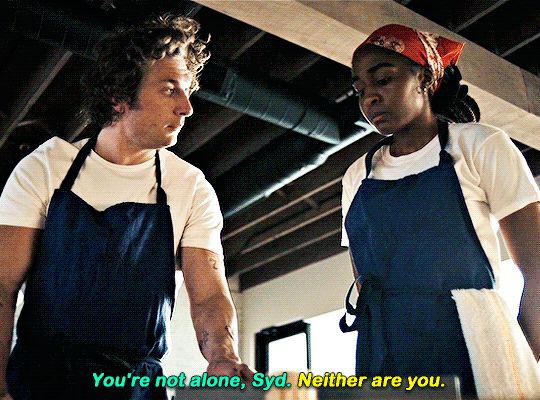
Cinematography and shot speaking, the moment ending mid-push felt abrupt. It felt like it could have gotten closer, but it didn't. The intimacy of the moment caught up with both of them, making their clean transition to a more stable position and a still shot type. (Above is a double cowboy shot - waist up, more comfortable[?])
But, script wise, it was a fully realized and well executed moment, that had a beginning middle and end. Their talk was real and cherished, transitioning to another moment where they share that they are not alone. This idea of leaving each other alone is, and becomes a very important motif throughout the series.
The flow of the cinematography differing from the flow of the script is not a mistake or a fluke. I believe that this is all completely intentional.
To us, we hear and we see the intimacy and the connection between these two. We heard their professions, and reassurances and their devotions to one another. What we're shown through the cinematography is a slowly building connection, that takes pauses at times, that has moments of stillness, but continues to push grow and learn alongside each other. We know, just as they know, that there is something there between them, and the transition from under the table to over it is reflective of their resistance. We don't really have those sort of close-up moments between Carm and Syd.
This is sort of saying, if we want to get them to let themselves get close to each other, they need to let it happen.
SO. To sum it up...
Clairecarmy scenes are feigning intimacy and faking the "build" to their connection - really just cutting straight to it
Sydcarmy scenes are real and hold a genuine intimacy between the two, but the only thing keeping it from being a fully realized relationship or connection is themselves. They need to let the build-up happen (because it does) and they need to let each other in(close-up to each other)
#the bear#sydcarmy#the bear fx#carmen berzatto#sydney adamu#the bear rants#tais ramblings#the bear meta#carmy berzatto#rants#scene analysis#script analysis#meta#the bear show#tais rants#tais thoughts
95 notes
·
View notes
Text
Lucifer's Speeches to Sam and Castiel in Abandon All Hope
Both of these speeches are so good and are revealing in how Lucifer not only sees himself but his relationship to these characters. As well as how he's leaving out key information in his story depending on how it suits him.
First he speaks with Castiel after trapping him in holy fire.
This is Lucifer's take on fallen angels. Rebellion = falling. Which is absolute and how heaven sees it. He sees a part of his much younger self in Cas, the beginnings of falling.
The emphasis in this speech is rebellion. The fact that Lucifer rebelled and was cast out. It lacks specificity, because the reason for rebelling is relevant for both angels. It's similar but Cas in this moment wouldn't see it this way so he leaves things vague.
And he's right. After Lucifer is locked back up Castiel does become the fallen angel and heaven's main target for YEARS.
The final part of this interaction always gets me because yes, Lucifer is the repeated death of Cas. Most importantly in Swan Song but later as well. This is where that was foretold.

Then he speaks to Sam during the grave ritual scene.
This is the speech where we get some detail. Still omitting a few key points, but this is where we actually get the sense that this was deeply hurtful to Lucifer. This is where he speaks about how close he was with his family and how personal this betrayal was.
I think the biggest line that we really don't appreciate until much later in the show is "All because I was different" Lucifer was different, he was the one God trusted with the mark to seal Amara and it changed him, and after that surely God and the others did look at him differently. They viewed him as a lost cause. Also the "I had a mind of my own" is interesting because it does make me wonder if that meant his mind couldn't be reset or fixed by god or the other angels, did they try?
The rest is a specific appeal to Sam's emotions, pulling on words he knows Sam will react to like "Freak" which he got from Sam in 5 x 03 when Sam confesses to him that he knows he's a freak, and he saw how upset Sam was about that term, so here he applies it to himself to strengthen the connection.

But we see he's very intentional with his use of words, telling the same story to a slightly different tune, all to make sure he is the most relatable and sympathetic to whomever he's speaking to.
With Cas it's words like "rebel" "cast out" "public enemy" With Sam it's words like "freak" "begged" "of my own" "different" "monster"
Then I think another key thing here is "who I loved" first of all, directly implies to Sam that he is capable of love. Which for angels is very different than the human concept. Second, past tense in reference to Michael.
In both speeches he uses his past to relate to the audience and then takes it a step further to imply that similarities in their stories mean they will share the same fate. "I rebelled, and was damned. So if you rebel they will damn you too" "I was called a monster by my brother and he turned on me, well your brother has called you a monster, so how long before he turns on you?"
Anyway just a look at how Lucifer uses words to very quickly relate and manipulate his audience to his purposes.
#spn#episode: abandon all hope#spn 5x10#my essays#script analysis#lucifer supernatural#castiel#sam winchester
12 notes
·
View notes
Note
saltburn review please ? it’s very important to me to know your thoughts
i’m so sorry i took forever to answer this, i wanted to really dive in and needed the time/headspace to do it in. it’s not the best movie i’ve ever seen by any means but there’s so many dynamics/themes/motifs that i can’t stop thinking about.
spoilers and me rambling endlessly under the cut
the relationship that has the most meat is obviously between oliver and felix. i’ve been ruminating on how love and hate are often not opposites but rather two ribbons dancing entwined with one another. both are an obsession. i can’t stop thinking about you. i loathe you. i wish you were dead. i can’t live without you. i need to be you, a part of you, inside you. i need to consume you. i can never get close enough. it infuriates me.
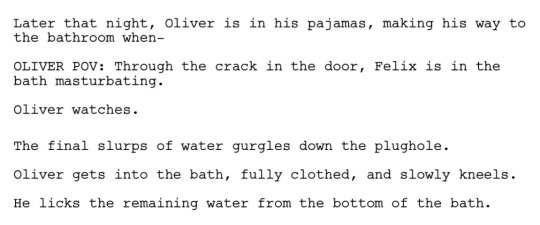

i want to fucking destroy you and then kiss and cradle every broken piece. i want to wear your skin. i have to get rid of you forever. i’ll never let you go.
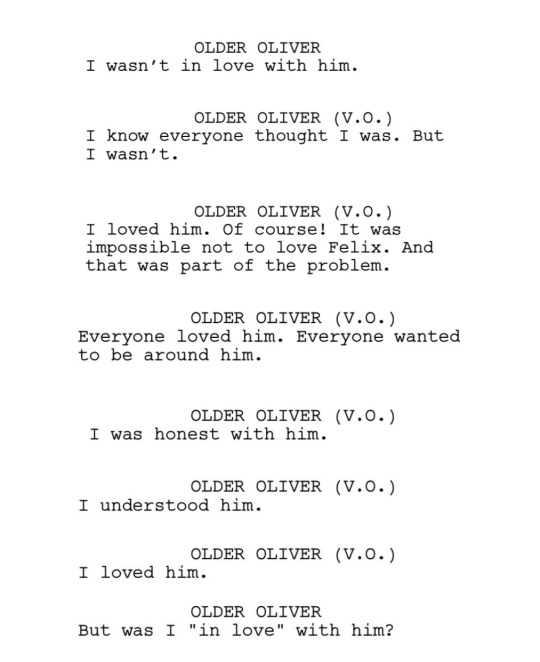
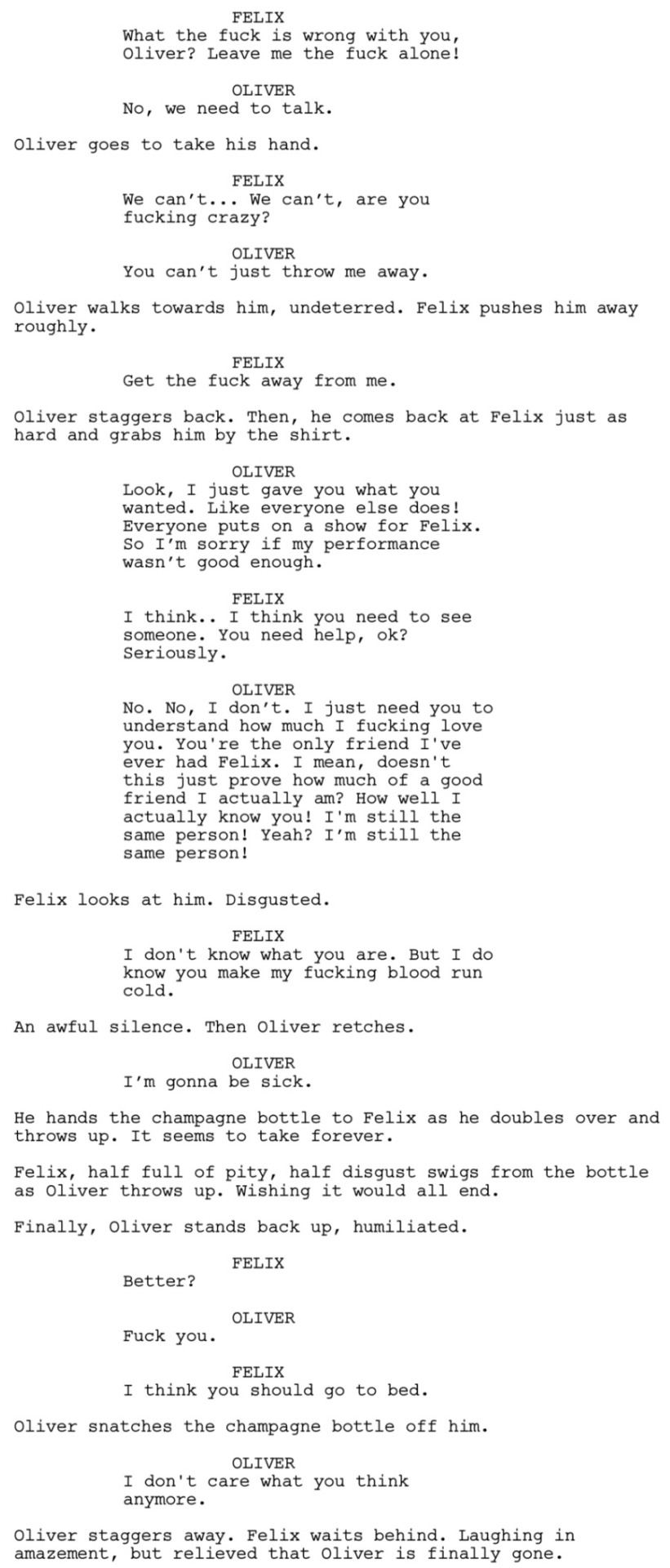
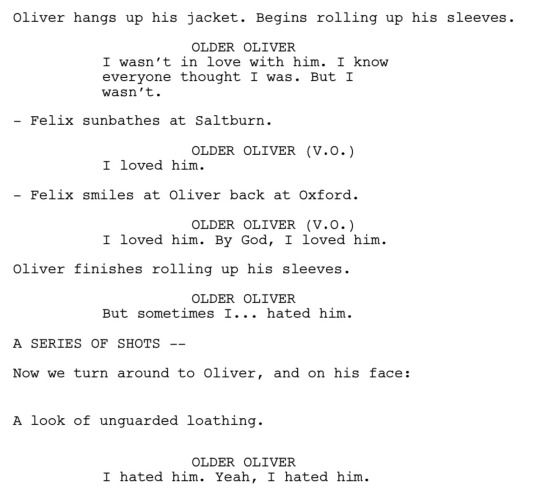
there’s also obviously a possessiveness that oliver has over felix (as well as most of the other characters at saltburn). “i protected him” (you’re mine).
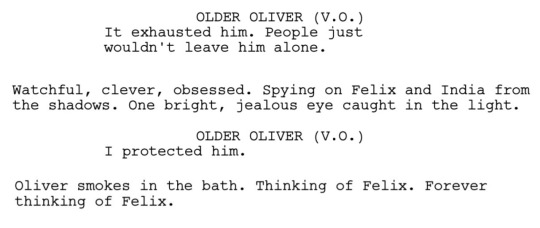
funnily enough, oliver is felix’s pet just as much as felix is oliver’s

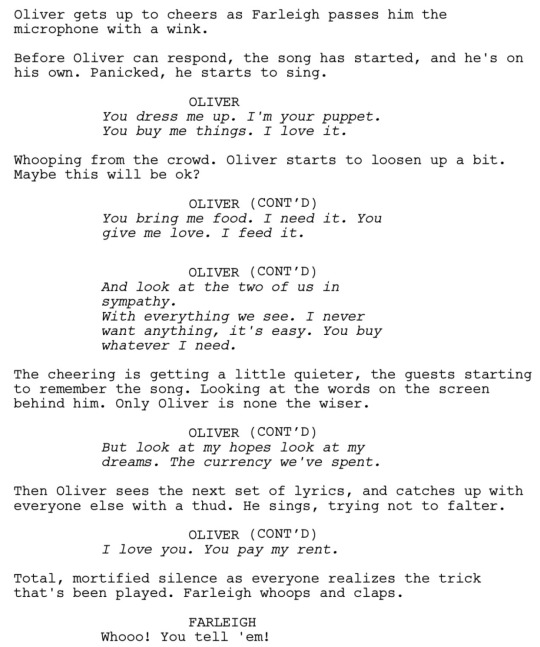
more on oliver’s character in general: everyone is a pawn to him and fills some emotional/psychological/financial hole.

when his real self slips through there’s a sociopathic dominance
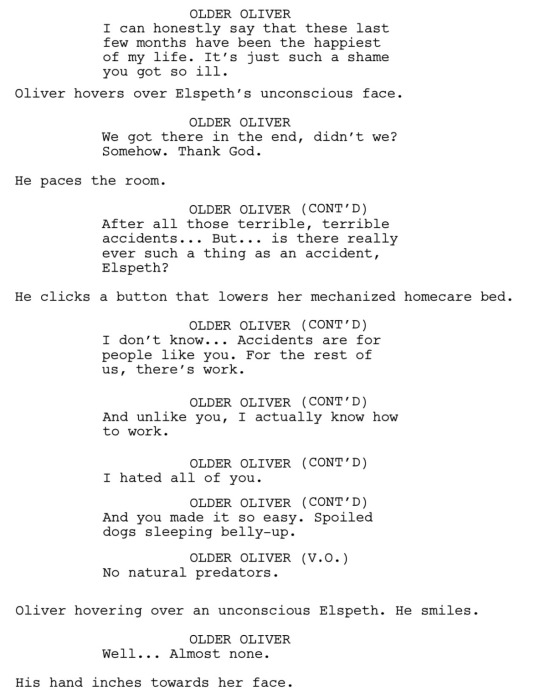
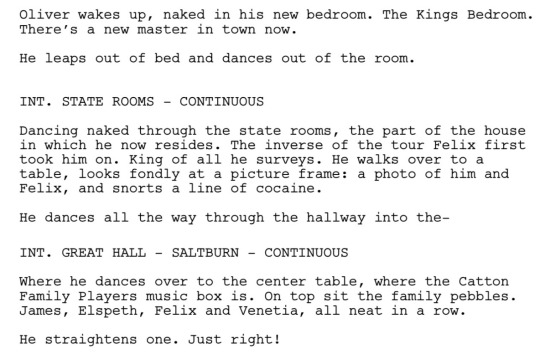
…..his need to make venetia and farleigh “behave”. his need to keep felix right where he wants him.
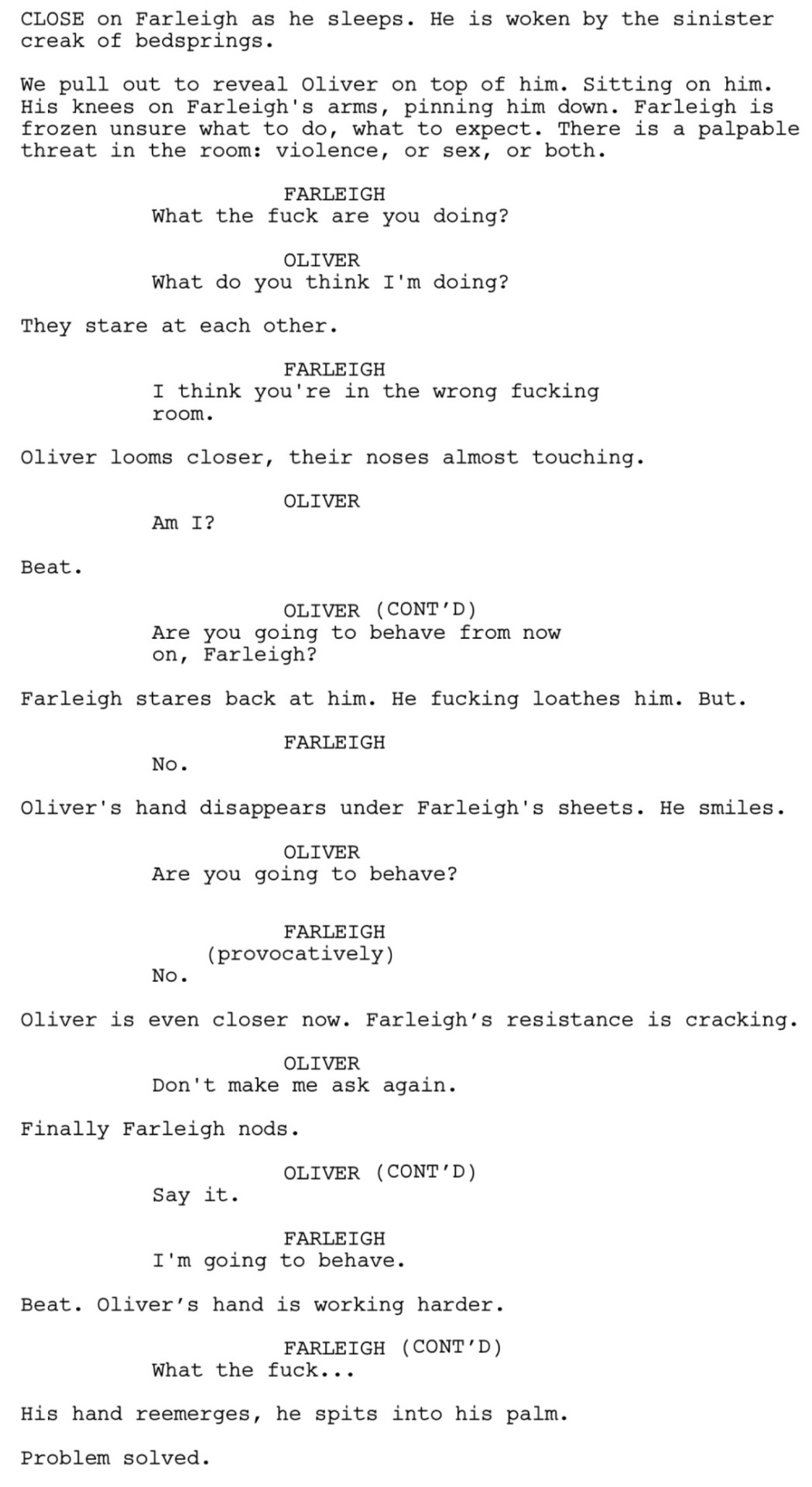
on venetia and oliver: obviously i love eroticism with a side of gore. vampiric and disturbingly intimate.
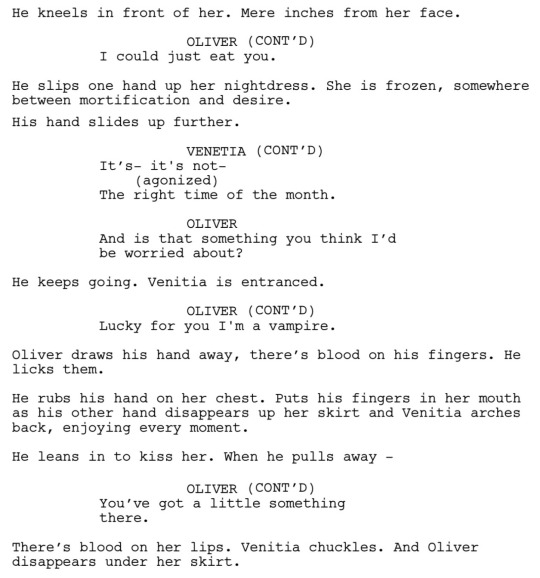
also loved the weird dynamic of control regarding venetia eating, again as if she were oliver’s pet
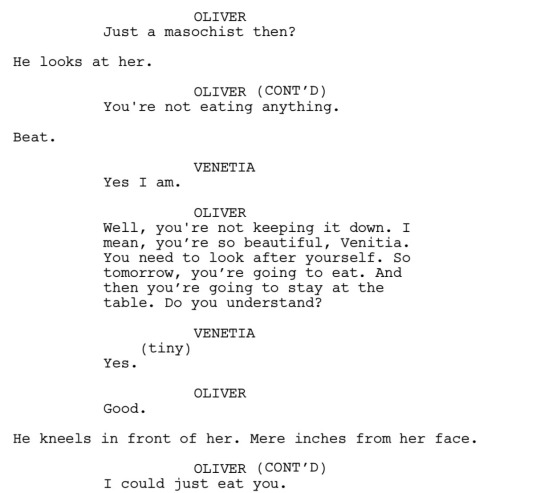

on felix and venetia: there are DEFINITELY little glimpses of incestuous undertones which were very interesting. they’re attached at the hip. matching tattoos. sharing clothes. venetia sits in her brother’s lap despite them both being adults. venetia seducing all of oliver’s closest friends and him being disturbed by it
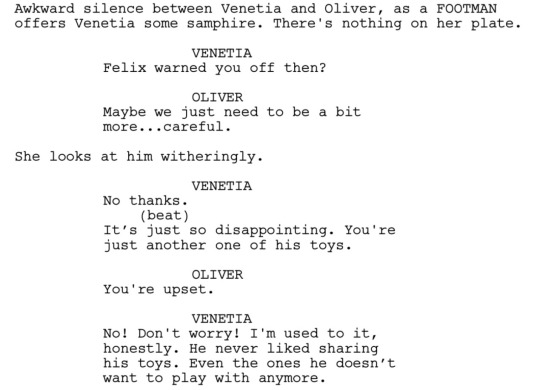
…venetia’s shock and horror at finding oliver is wearing felix’s aftershave right after they bury him but also being intoxicated by the twisted perversion

more on venetia: i really liked her character as a whole and the actress’ portrayal of her was enthralling. she’s truly a cold blooded ghost, and a snake at times

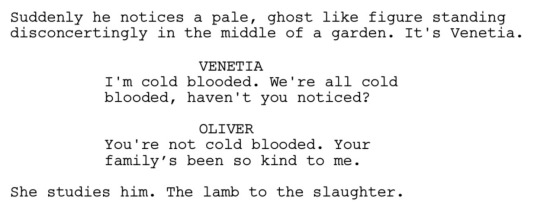
finally here’s some miscellaneous sections of the script that i really liked

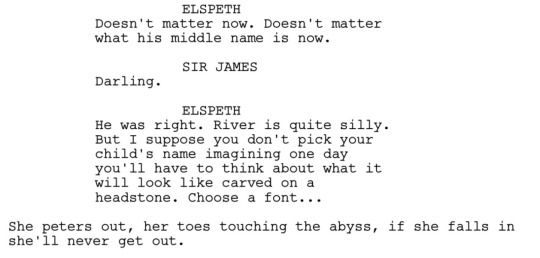
53 notes
·
View notes
Text
I was reading the Breaking away script and I found some juicy stuff fjdjdnd
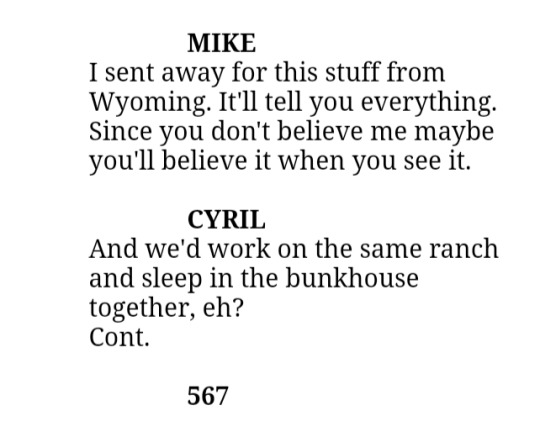
Like Cyril and Mike being gay as hell-- seriously what tf did Cyril mean by that?--
Ik what he is..--
Here's some more stuff! ↓

This for instance LMAO


Also Cyril being wittle BBY..
Again I love Cymike but Cydave is def a close second bc Dave is an absolute sweetheart to Cyril

(Dave x Mike moment)


Cyril, again, being wittle bby, AND cuddling his homies goodnight 🤔


Lastly Cyril again being an absolute darling PLZ someone show him affection, PLZ give him a big fat smooch PLZZZ
#breaking away (1979)#breaking away film#breaking away 1979#breaking away movie#breaking away#breaking away script#script#script screenshots#script analysis#analysis#shipping#ships#cymike#cydave#dave stohler#cyril#cyril x mike#cyril x dave#dave x mike#wittle bbys
4 notes
·
View notes
Text
Analyzing Nick Dear's Frankenstein (and why we should move on to better play adaptations)
Alrighty y'all, its the long-awaited Nick Dear Frankenstein analysis post! This post is focusing specifically on Dear's characterization of the Creature, and why it negatively affects the play overall (plus some adaption theory added in for funsies). For additional context, I am an MFA candidate studying theatre, and I did this research and the accompanying slides for a project in my graduate-level theatrical criticism class. Basically this post is the text version of that presentation, with some of the slides included, and the fluff trimmed. There is a fair bit of academic jargon in here, but I tried to make it as accessible as possible!
And with all of that out of the way, the Nick Dear Frankenstein deep dive is under the cut! (And citations at the end.)
CW: Discussions of violence and SA.
Before I get into the script itself (which if you are interested in reading it, a PDF version is easily found on google), I want to introduce a fun adaptation theory which is specific to studying Frankenstein, called "Frankenstein Complex Theory." This theory comes from Dennis R. Cutchins and Dennis R. Perry in the introduction section to "Adapting Frankenstein: The Monster's Eternal Lives in Popular Culture." (A fantastic read that I recommend to anyone if your school or local library has it in circulation.) This introduction introduces the "complex" theory, as well as some really awesome ideas that get used and referenced by all of the authors included in the book.
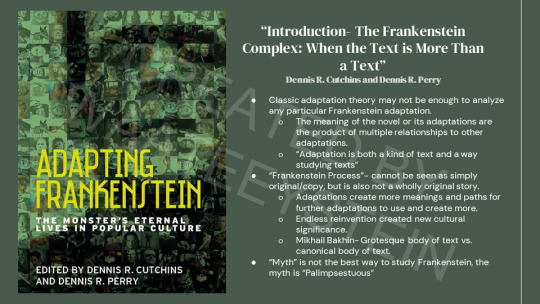
Basically Cutchins and Perry assert that traditional adaptation theory is simple not enough to properly study Frankenstein and it's innumerable adaptations. One might also assert that Frankenstein itself is an adaptation, Mary Shelley published multiple editions of her story, and one could argue that the original story is an adaptation of other stories like "Paradise Lost." Linda Hutcheon, another academic in the field of adaptation studies who also wrote a fantastic book (cited at the end), talks about this idea of "palimpsestuous Intertextuality." I want to first argue here that the original text of Frankenstein and its adaptations (the "myth" of Frankenstein) are palimpsestuous.
And when I say the "myth" of Frankenstein is "palimpsestuous," its basically just saying that the "myth" (tall green guy with bolts in his neck who is mostly non-verbal, going around killing people mostly without rhyme or reason) is the predominate cultural narrative of Frankenstein's monster, rather than how he actually is in the book. All of the cultural ideas of what Frankenstein's monster is are this giant network which interweaves with itself, references and builds off itself, and constantly creates new things from these connections. The book and it's adaptations are not in hierarchy, one is not implicitly better or more important than another, they all work together to create our cultural narrative of Frankenstein's monster. Thus, palimpsestuous Intertextuality.
But what is this "Complex" theory I mentioned earlier, and what does it have to do with Nick Dear? Well, here is a helpful diagram!
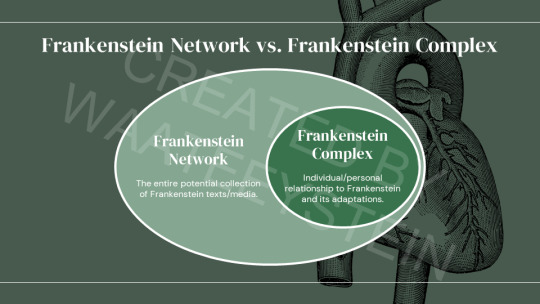
Essentially, every piece of Frankenstein media every created, including Mary Shelley's original novel, are all part of the "Frankenstein Network." The complex, however, is personal, it includes anything from that network that you have personally consumed. Some people have a wider complex than others, but nonetheless, most of us have some kind of Frankenstein Complex (if you're this far in the post I'm assuming you have one lol.) I think Cutchins and Perry really popped off when they created this theory, its a fantastic way of studying/teaching adaptation.
But onto Nick Dear. Why did I just spend so much time covering adaptation theory and teaching you all a bunch of academic jargon? Well firstly, I spent a lot of time on that research for class and I wanted to share. But secondly and more importantly, my thesis for this entire post is that Nick Dear, whose goal with his play was to create an adaptation which humanized the Creature and sticks very close to the novel, created something that was unintentionally more a product of his personal complex and the palimpsestuous "myth" of Frankenstein's monster. He wrote a play that deeply mischaracterizes the Creature, and in turn uses violence and SA for shock value rather than substance.
And maybe this is a bold claim, but I think comparing the plot of the novel (from the creature's point of view) and the plot of Dear's play is a good place to start. And for your visual reference, I created a plot diagram for both so that we can compare the two side-by-side. (Thanks Freytag lol.)
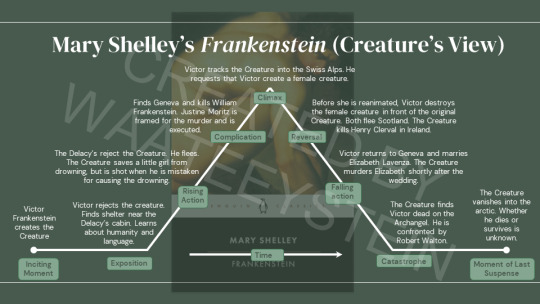
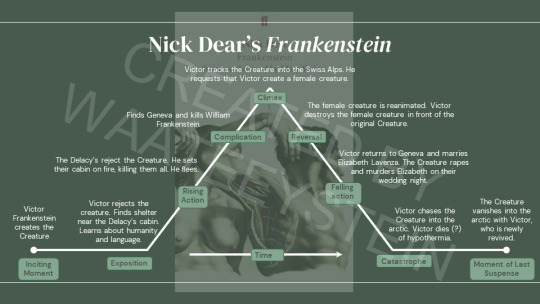
The first thing we can notice about comparing the overall plot structure is that they are indeed, very similar. And this tends to be most people's reactions to seeing this play. That compared to most other Frankenstein media, it is super faithful to the book in terms of setting and characters and hitting important plot points. And I too want to praise Dear for that. I think he was extremely smart about what characters he chose to cut or combine, and the plot points he chose to include. I also personally love that despite the cutting of Walton's character, Victor and the Creature still visit the arctic at the end of the play. Dear made so many great choices with his play, but ends up squandering it his mischaracterization of the Creature.
But how is he mischaracterizing the Creature? Well first, lets look at how Shelley characterizes him in the book, specifically in terms of violence. I argue, that anytime the Creature kills someone in the book, it is a mostly equal/proportionate reaction to the violence done against him. His first murder his killing William, and the subsequent execution of Justine after he frames her for William's murder. All of this comes after Victor's initial rejection of the Creature, and rejection by multiple villages, the DeLacey's and the young drowning girl and her father. Killing William and Justine was his first retribution after all of the rejection and violence against him, which was initiated by Victor creating him and rejecting him in the first place. And this is his only planned revenge at that point, his next move was demanding that Victor create a female creature for him, with the plan to flee and live a peaceful life in South America (whether he actually meant what he said is up to interpretation.) His next murders only come after Victor destroys the unfished female creature. This is when the Creature kills Henry and then Elizabeth. Elizabeth (and arguably Henry) are Victor's partners, and the people he most personally loves. Killing them is direct retribution for Victor destroying the female Creature, who was supposed to be (at least from the Creature's perspective) the Creature's romantic partner. All of the Creature's direct murders are direct mirrors to Victor's transgressions against the Creature. William is killed for the initial rejection and subsequent exiling from society, Henry and Elizabeth are killed for the destruction of his future romantic partner.
Dear takes a different approach in adapting these murders. In his play, the Creature's first murder is not William, but is actually the DeLacey's. After being personally tutored by Father DeLacey for a significant amount of time, the eventual and fated meeting with Felix and Agatha arrives and the creature is rejected by them. Instead of going straight to Geneva, as he does in the novel, he first sets fire to the DeLacey's cabin, killing the entire family inside. To me, this feels like the first instance of spectacle and shock over actual substance. In both Shelley's novel and Dear's play, as the creature learns about humanity and war, he clearly has a distaste for violence and killing. And because of this, I don't understand why the Creature has such an extreme reaction to the DeLacey's, especially in this version where Father DeLacey shows him so much direct kindness, and it is Felix and Agatha specifically who reject him. Why would the Creature decide to kill them all? If Dear wanted to add additional deaths, why not just kill Felix and Agatha and spare Father DeLacey because of his previous kindness? This violence, to me, feels undeserved and does not mirror the violence done against him by this family. From a staging perspective, the visual of the house burning is actually a very impressive collaboration between the set and lighting designers on the giant stage of the National Theatre. But I question why this moment needs to be here, when the rest of the play and it's staging in the premier production already has so much beauty and shock and spectacle. This is also the first moment where I find the Creature unsympathetic, because this action seems overly extreme as a response.
After this moment, the murder of William is different but not too dissimilar in tone to the novel. At it's heart, it is still the Creature's first direct revenge against Victor. After this, our next big departure from the novel is when the female creature is fully brought to life, different to the novel where she is never fully given life. Victor killing her after she has been able to briefly live is a more extreme measure on Victor's part too, which by my own argument, may warrant a more extreme reaction from the Creature. And to be absolutely clear, Victor simply kills/dismantles her, and nothing more. As for the creature's reaction, Henry is a cut character in this adaptation, so we obviously don't see his death. Instead, the Creature kills Elizabeth, but in this version, not only does the creature kill her, he also r*pes her. This is my biggest point of contention with the play. To me, the subtext in Dear's version is that the Creature views both Elizabeth and the Female Creature as some kind of property, and when his property (the female Creature) is taken away by Victor, he takes Victor's property (Elizabeth) away too. Right before her death in the play, the Creature and Elizabeth actually have a really touching conversation, and they seem to genuinely bond. And so when the Creature eventually kills her afterwards, him r*ping her comes completely out of left field. The only explanation to me, is that despite empathizing with her, the Creature ultimately still views her as Victor's property, and needed to take her away from Victor in a way that was more than just taking her life from him. And honestly, it's a really gross interpretation of these characters. And I want to be very clear that I know depiction is not endorsement, and that I also believe there is a time and a place for depicting SA on stage, but this play was not the time nor the place. The creature simply killing Elizabeth is enough to get the point across, the SA seems to have been added for pure shock value, and again, spectacle. One could argue that this action done by the creature is part of his sexual awakening, just as he learns about other aspects of humanity. But again I believe this is not justified by the text of the play, and is written for pure shock value at the expense of another character, specifically a woman. I would call this misogynistic.
And these extreme reactions from the Creature in Dear's play seem to create this hyper-masculinized version of the character and the story. And I think that is a shame considering the original story was written by a woman, and Mary Shelley did a fantastic job of writing a story where the men can exist across a spectrum of masculinity, without needing to be this stereotyped version of hypermasculinity with a desire for sexual vengeance. I mean, Victor creating the Creature is a pretty clear metaphor for motherhood/parenthood, especially considering Shelley's experience with motherhood and the loss of her children and her own mother. And not to say that a cis man isn't capable of writing an authentic adaptation of a woman's story, but here, I think Nick Dear missed the mark, especially in regards to Elizabeth's death and his depiction of Creature/masculinity.
And I don't want to boil this down to, "Nick Dear is a man and therefore his adaption is automatically bad." Because I don't think that's the case, and I think that's an unfair assumption to make. What I do think, is that despite trying to make an adaptation that strove to humanize the Creature better than most other adaptations, Dear instead created an adaptation that fell into the overly-violent monster tropes of the greater Frankenstein Network of adaptations. In essence, Dear may have unintentionally become a product of his own "complex." And unfortunately, that subconscious influence may be partially why we get this interpretation of the Creature, and the unnecessary shock factors added into the story.
So where do we go from here? Chances are, if you see a theatre company putting on a production of Frankenstein, it's probably the Nick Dear version. This was the case for me last October when I accidentally attended a production of this script at a professional theatre company back home in Florida. My hope is that one day we can move on from this script, and find a Frankenstein play adaptation that humanizes the Creature in a way that most audiences (who probably have not read the book) are unfamiliar with, while also not resorting to shock value that dehumanizes the women in the story. My homework for myself beyond this research project, is to read more Frankenstein play adaptations, and specifically ones that are not written by cis men. I think the experiences of women, trans people and disabled people (or obviously any intersection of these communities and identities) could really lend themselves to new and exciting interpretations of the script that bring broader perspectives into context. If you have any suggestions of Frankenstein plays or playwrights who have written Frankenstein plays, I would love to check them out! I also suggest giving the National Theatre world premier pro-shot of Nick Dear's Frankenstein a watch, purely just for the design of the show. Costumes, set, sound and lighting are all really spectacular, and I would love to do an analysis of that aspect of the show one day.
Obviously there was a lot about this show I didn't cover (Cumberbatch, I know), I just wanted to cover the characterization of the Creature at a textual level, because to me that is the most glaring issue with this play. Please let me know your thoughts, and thanks for reading if you got this far!
Citations (I didn't do a great job of referencing these in-text, but all of these sources are great and I highly recommend checking them out!)
Cutchins, Dennis R, and Dennis R Perry. “Introduction- The Frankenstein Complex: When the text is more than a text.” Adapting Frankenstein: The Monster’s Eternal Lives in Popular Culture, Manchester University Press, Manchester, 2018, pp. 1–19.
Dear, Nick, and Mary Wollstonecraft Shelley. Frankenstein: Based on the Novel by Mary Shelley. Faber and Faber, 2011.
Hutcheon, Linda. “Beginning to Theorize Adaptation: What? Who? Why? How? Where? When?” A Theory of Adaptation, Routledge, New York, New York, 2006, pp. 1–32.
Jones, Kelly. “Adaptations of ‘liveness’ in theatrical representations of Mary Shelley’s Frankenstein.” Adapting Frankenstein: The Monster’s Eternal Lives in Popular Culture, Manchester University Press, Manchester, 2018, pp. 316–334.
Pfeiffer, Lee. “Frankenstein: Film by Whale [1931].” Encyclopædia Britannica, Encyclopædia Britannica, inc., 24 Nov. 2023, www.britannica.com/topic/Frankenstein-film-by-Whale.
Shelley, Mary. Frankenstein; or, The Modern Prometheus. 1818.
Shelley, Mary. Frankenstein; or, The Modern Prometheus. 1831.
#please be nice in the replys!#I hope you all enjoyed this little read#I spent a day writing this instead of doing my actual time sensitive work#frankenstein#frankenstein or the modern prometheus#victor frankenstein#frankenstein monster#mary shelley#nick dear#nick dear frankenstein#script analysis#play analysis#Frankenstein play#waateeystein speaks#waateeystein reviews
15 notes
·
View notes
Text
VAN SCENE SCRIPT ANALYSIS | 4×08 (byler)
Full Script 👇 (Provided by @strangerwriters official twitter account)
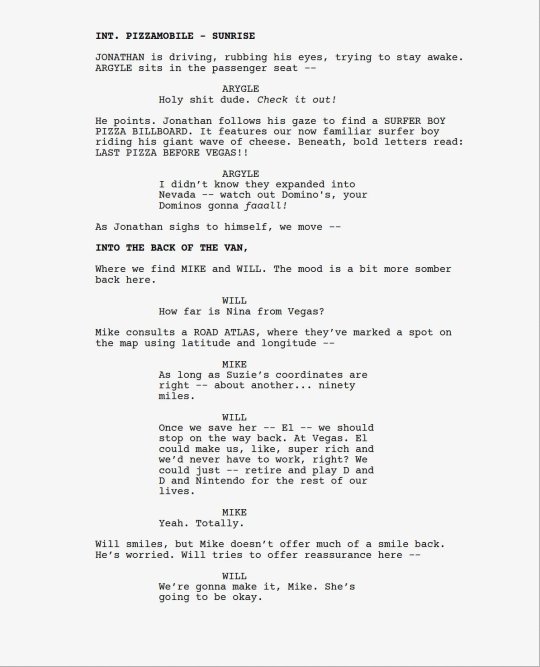



Now, we start.
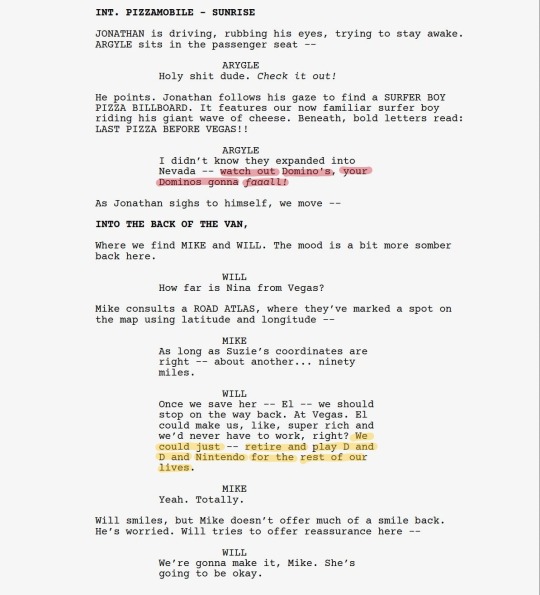
First, we get an introduction to the scene, as Argyle is talking about another pizza store called Domino's, and he says this interesting phrase before the focus goes to Will and Mike -> "Your dominos gonna fall"👀
Then, the focus goes to Mike and Will. They're having the Vegas conversation, where Will jokes about El making them super rich.
- [...] We could just -- retire and play DND and Nintendo for the rest of our lives. (This phrase is so important to the byler plot, because it reassures what Will already said in season 3: He wants to be with Mike his entire life <3)
But, he notices that Mike is not in a great mood by the moment, so, instead, he comforts him.
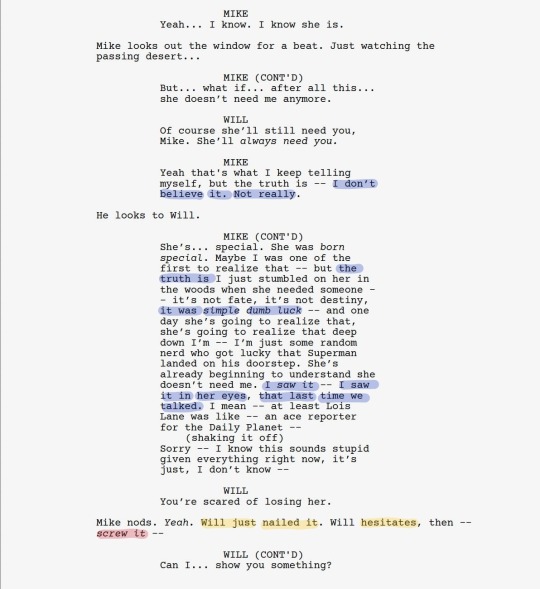
Mike says how he feels, he's afraid of the idea of El not needing him anymore. He says this interesting phrase when Will reassures him that El will always need him:
- [...] That's what I keep telling myself, but the truth is -- I don't believe it. Not really.
It's like, a part of him already assumed that El will no longer need him. We confirm this when he mentions that meeting El was not fate, it was just dumb luck. It was not a choice.
He says that he started to understand that El doesn't need him. He saw it, he saw it in her eyes. -> WHY WAS THIS PART DELETED FROM THE VAN SCENE??? THIS IS SUCH AN IMPORTANT MENTION.

If we connect the "I saw it. I saw it in her eyes" line with the "I don't believe it. Not really" one, we can see that the writers intention was to show us that Mike already knows that El doesn't need him, so it turns his monologue from 4×09 to be even more contradictory 👀
This moment was like the perfect excuse for Will to finally show Mike his painting. He's not sure at first, but then, he doesn't even care about anything anymore. -> Screw it.
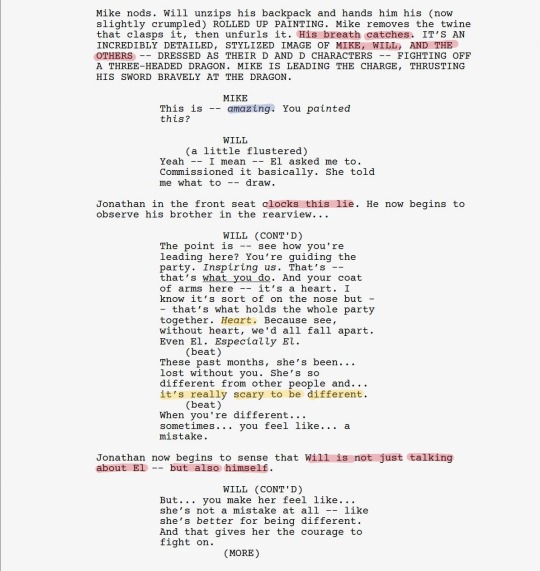
When Mike first sees the painting, his breath catches. That was his first reaction, and this is so interesting, because this expression has been used before in ST scripts, with other couples👀
I also want to point out the way how Mike and Will are apart from the rest of the group, when the script says -> Mike, Will and the others.
Mike thinks the painting is amazing, he can't even believe what he's seeing. But Will messed it up, saying that it was commisioned by El -> He lied.
and every lie has consequences in ST.
Jonathan clocks the lie, he knows what Will is going through. Will makes it even more obvious to him when he starts talking about being different and how scary it is. -> Will was definitely not talking about El.
Will also explains Mike why he added a heart to his shield, making a whole speech about Mike being the heart of the group. (I wonder if that was his plan from the beginning, or if he just made up that whole speech in his head right in that moment.)

When Will keeps talking about his feelings (covered up using El's name), he also says that losing Mike hurts, as he gets emotional.
- [...] Losing you -- It just hurts -- It hurts too much.
That line was deleted from the scene (And I'm glad it was, because it's so painful)
When Will finally reassures Mike and tells him that El will always need him, Mike is supposed to ask "You really think so?" And Will should have said "I know so", confidently.
But instead, it was replaced with a simple but emotional:
- Yeah?
- Yeah.
It goes back to the part of 4×04 where, instead of the "Cool - Cool" exchange, Mike and Will should have said those previous lines (Yeah? - Yeah.)
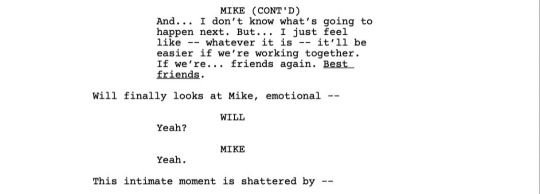
Finally, we see that Will turns and looks out the window, giving way to melancholy. But he wasn't supposed to cry, it was all a part of Noah's acting. Such a talented boy <3.
56 notes
·
View notes
Text
In Short: I Was Right About The Released Script and The Filmed Monologue.
In this post here about the discrepancies in the released 4.07 script as compared to the version of One's monologue that we see on screen, I mentioned a sneaking suspicion that they might be two halves of a whole monologue.
So, I spliced the 4.07 transcript and 4.07 script together:
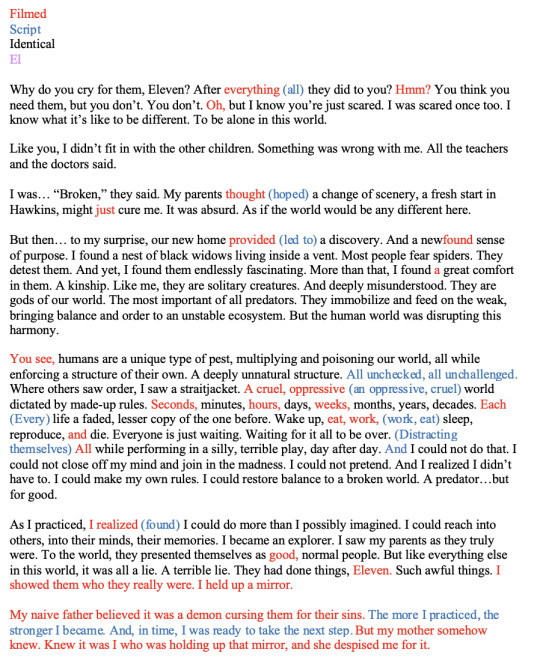
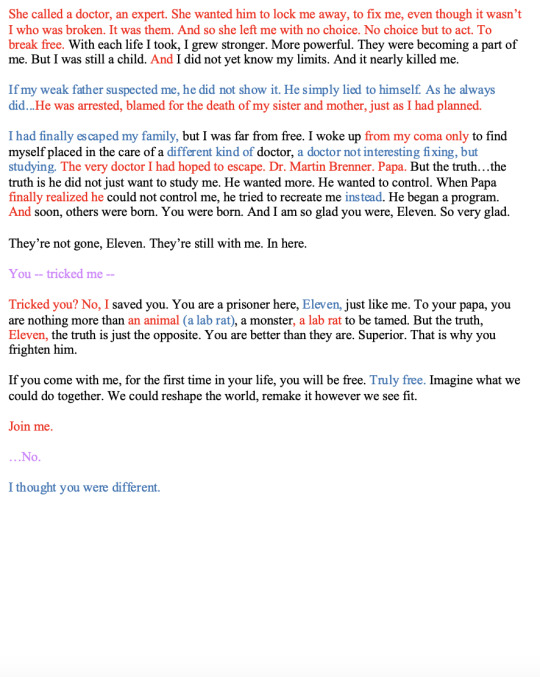
For clarity's sake, I color-coded it. Red-colored lines are ones that only appear in the filmed monologue. Blue-colored lines are ones that only appear in the released script. Words in parentheses indicate a swap in wording/phrasing. Words not in parentheses are additional words. Everything is left in order of appearance, i.e. none of the lines have been shifted for clarity. The texts are one-to-one merged.
As we can see, they splice together very nicely...especially in places where we were missing subjects, conclusions, topic introductions, and/or topic re-introductions in the individual texts.
For example:
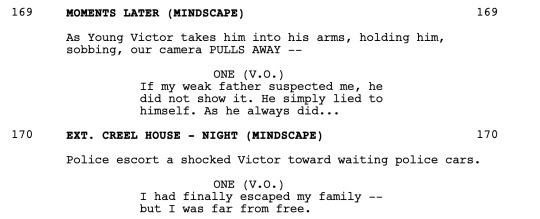

In the script, the conculsion/Victor's fate is not mentioned. In the transcript, Victor is never re-introduced to El as the subject of his own arrest.
In the merged version, it becomes:

Victor is re-introduced to El, and his fate is told.
Or here:
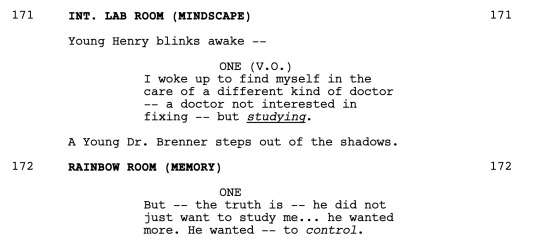

Brenner's goals with One is introduced in the script, but the part about "fixing" comes out of nowhere, since Virginia's goal of fixing Henry is never brought up. "A doctor not interested in fixing" implies that someone had been interested in fixing him. No such case is mentioned. Meanwhile, Virginia's goal of fixing Henry is mentioned in the transcript, but Brenner's "studying" part comes out of nowhere. "He did not just want to study me" implies that being studied was mentioned previously. It was not.
In the merged version, it becomes:
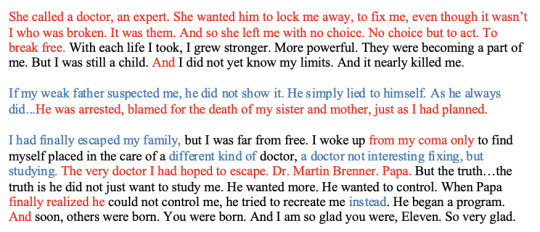
Fixing? Mentioned by discussion of Virginia. Studying? Mentioned via Brenner's introduction.
And even within that section:
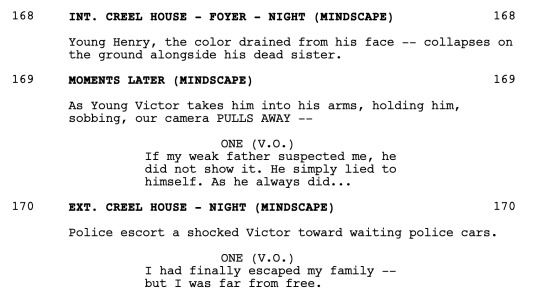

The transcript initially mentions why Henward wants to escape/break free, but it veers away from it with Victor's arrest...only to revisit it out of nowhere directly after. The script never introduces breaking free/why Henward wanted to escape, but it does go from Victor's knowledge (or lack thereof) directly into a clear reintroduction of his need to escape.
In the merged version, it becomes:
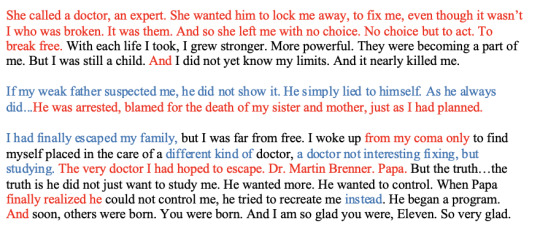
Reason for escaping? Given. Escaping? Clear reintroduction to the topic.
The two texts fill in each other's gaps, just as I suspected.
Now I won't say that there aren't some wonky bits, particularly in the "My naive father...for their sins" and "The more I practiced...take the next step" sections.
These exist entirely separately, and they overlay the same memory: Victor's cradle vision and Henward in the red sweater sitting in the attic.
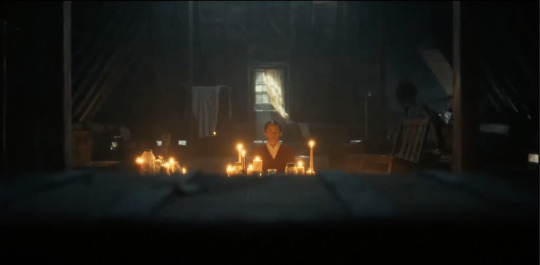
This becomes interesting when we consider that this ^ isn't Nancy's POV. Nancy is downstairs watching Victor...
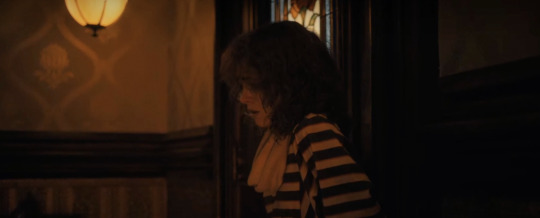
...and this view is peeking over some boxes in the attic, supposedly seeing Henward while he's enacting said vision:

It, like this scene:
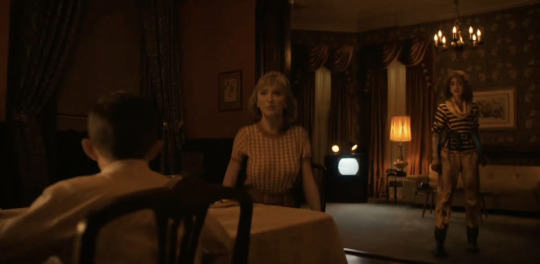
Is from a bizarre outsider POV, one that's about Henward-height.
So my thoughts on that wonky-ness amount to this:




I would speculate that the two lines don't feed into each other, but may instead be meant to occur simultaneously from different people (whether that be via a time loop or via timelines...I can't say for certain).
Either way, the texts do line up as two halves of a whole.
#doing my part lol#timeline theory#script analysis#4.07 script#st nina project#henry creel#edward creel#henry/vecna/001#edward/vecna/001#stranger things
44 notes
·
View notes
Note
can you give any theatre/acting related advice that you have learnt through your studies as a theatre major? thanks
Anon I am SO sorry - this ask is from a year ago and I literally JUST saw this and I have absolutely no idea how that happened. I hope that you are still following me and will see this!
EDIT from May 2023: Haha. Oops. This ask is now from maybe like two years ago? Possibly almost three? I genuinely don't know. But I am so sorry that it's taken so long. I remember exactly what I was doing while typing my original response to this: I was folding laundry and trying to get ready to move back in to school, and I was procrastinating doing the folding by typing my response to this, and then my parents came in and were like "why aren't you folding laundry" and I remember saying to myself that I would come back to this ask and then I never did. But you probably don't care about that much, so here we go:
My top three things I have learned, in order:
Number One: Script analysis is everything. It will help you connect to and understand your character, it will help you to connect to and understand the world of the play - it is the foundation for understanding everything. Look at the historical context of when the play was written and where it stands in the playwright's repertoire chronologically. Look at word choice. Look at how the characters interact with each other. My favorite books I recommend for this are A Practical Handbook for the Actor by Melissa Bruder, Lee Michael Cohn, etc. and Backwards and Forwards by David Ball. I read these books in my senior year of high school, so four years ago now, and I still use their methodology for all of my script analysis. Their methods are incredibly useful and I highly highly recommend reading them. B&F was also required reading for my Script Analysis course at my university this year, and it is still just as useful. The books are old enough that they aren't too expensive to buy, and you could probably also find copies online, though I'm not sure of that.
Two: One of the best, and in my opinion most accessible methods of script analysis (especially if you don't want to read a whole book) is the Question Words Method: Who? What? Where? When? Why? How? This works for monologues as well as general script analysis, and is usually applied to one character at a time.
For monologues: Who is speaking? Who are they speaking to? What are they trying to achieve by speaking? Where are they while they're talking? When in the course of the story is this happening? Why are they talking about this now? Why not later, why not sooner? To quote one acting teacher I had, why are they opening their mouth? And finally, how are they going about getting what they want? What tactics are they using, what's their word choice? What actions are they taking as they speak?
For characters: Who are they? This includes, name, title, relationships, basic biographical information. What do they want? What is their goal throughout this story? Where does this story take place? When? For a particular scene, where and when does that scene take place (general setting) and when in the course of the story does it take place? Why do they want whatever it is that they want? And how are they working to achieve it?
The most essential part of this, in my opinion, is what does the character want, and how they are going about achieving that. It's the objective and the tactics.
Three: This comes from one of my professors from this past school year. There is this idea in the world of theatre that if there's anything else you can see yourself doing, you should go do that because acting is only for people who can see themselves doing nothing else and just really really want it. Which is stupid because just because you might be able to imagine yourself taking a different career path doesn't mean you would be happy doing it. So, from my professor: "If you could see yourself doing anything else, do this anyway, because it's better." Again: If you could see yourself doing anything else, do this anyway, because it's better. If this is what you love, who cares about what else you could be doing? Do the thing that is fulfilling and makes you happy. It doesn't matter if other people think that it isn't a good career or won't make you enough money. If this is what you love, do it, because it's better than anything else.
I sincerely hope that this advice was helpful to you! Again, I'm so sorry that it's taken me so long to answer your ask; time unfortunately is not my friend and I've had a lot of - for lack of a better word - bullshit happen to me this year. Best of luck going forward, and please know that although it may sometimes take me a while to respond, my inbox is always open! I love giving advice, and am always happy to provide it!
#anonymous#answered#theatre major#theater major#theatre advice#theater advice#acting advice#script analysis#backwards and forwards#practical handbook for the actor#zoe gives advice#zoe speaks
25 notes
·
View notes
Text
New script episode is out now! This time we’re discussing the demise of the Creel family and how Henry contradicts himself when telling Eleven about his past. Enjoy!
#stranger things#nancy wheeler#dailystrangerthings#tvstrangerthings#el hopper#eleven hopper#eleven stranger things#jane hopper#vecna#vecna stranger things#vecna/henry/001#vecna/henry/one#001 stranger things#henry creel#alice creel#podcasting#podcast#apple podcasts#spotify#script analysis#script
0 notes
Text

"There is nothing more deceptive than an obvious fact." - Sherlock Holmes
Wednesday night, I will present "Drama Detectives: A Script Analysis Workshop" at 6 p.m. Central via Zoom. 🕵🏼♂️
Hope to see you there!
Registration link 🎭
📸: Mayra Alexandra
#acting#acting classes#actors#jade esteban estrada#getjaded#theatre#actor#acting masterclass series#actress#acting class#script analysis#acting teacher#acting coach#acting technique#acting training
0 notes
Text
I love this so fucking much

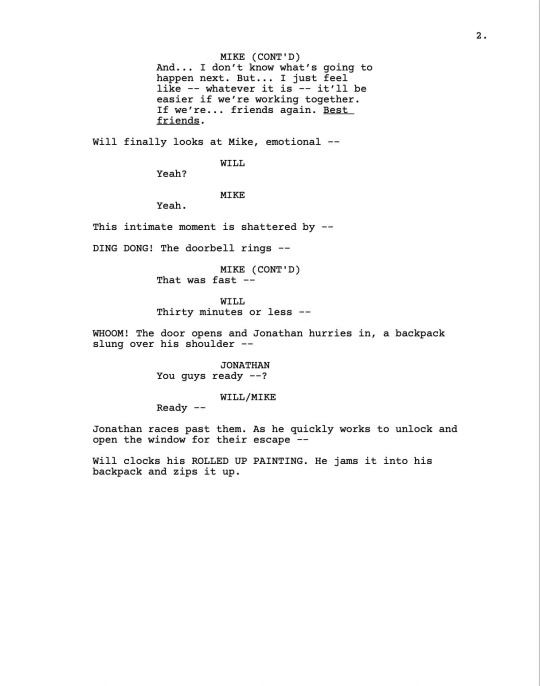
i fully believe the reason the final cut of this scene is so different is because they changed it to be more subtle. cause if you imagine it played out on screen, it's so unbelievably romantic. the final cut is also extremely romantic, but the og is just nuts to me. i'm also pretty sure the duffers said they change things and cut things out to make things less obvious, so take that as you will
1. will is still kneeling on the floor, but there's no direction for mike to sit on his bed. it says mike goes up to him, which could be a lot of things, but since will is still on the floor im guessing mike was meant to squat down to his level or kneel next to him. already way more intimate than the final cut where mike sits on his bed. so as we go through this, make sure you keep in mind they are sitting right next to each other
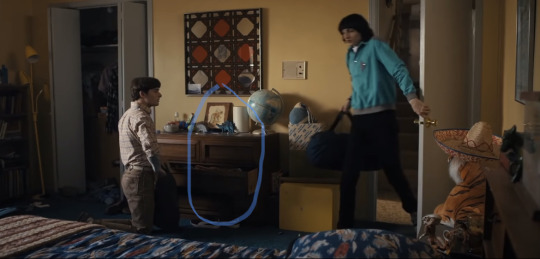
i imagine he was supposed to be right there
2. 'you didn't have to' wasn't in the original script. originally, mike and will were supposed to let will's words hang in the air and smile at each other for a second or two (probably the same amount of time between 'you didn't have to' and 'hey, also-' in the final cut). they were supposed to smile at each other until mike says "Hey, listen [...]", then will looks away. a few uncut seconds of them....smiling at each other.....until one of them awkwardly breaks the silence.... y'all.
id also like to bring up what finn said about mike not knowing about will's feelings, but there also being a mutual understanding and acceptance. i think what he means is that they mutually understand how different and special their relationship is. "i didn't say it..." with no response but a shared smile implies the same thing the final cut does. will didn't have to, mike understood anyway. that shared smile is supposed to be them acknowledging that. they both know it, and i honestly don't know how finn and noah were supposed to act that out without it being so obviously flirty and blushy. hence why they most likely didn't keep it in. also remember that they're supposed to be right next to each other probably face to face. THE OG WOULDVE BEEN SO BLUSHY AND AWKWARD LIKE.......
3. "If we're....friends again. Best friends."
lord jesus
given that at this point in s4 the audience is meant to have already put it together that will likes mike, that line is crazy to me.
"If we're..."
WHY DID HE HAVE TO THINK??? WHY DID HE HESITATE???? the watcher already knows there is romance present in this dynamic, how fucking else is that meant to be taken?? this is also stranger things, the show where a staple in their romances is that they always claim they're just friends, when they're not. and it's MIKE saying this, not will.
and right after this, it says "Will finally looks at mike, emotional." so during mike's entire monologue, will isn't looking at him. to be honest i think them staring into each other's souls in the final cut it more romantic, but mike saying all this to a will who isn't looking at him adds a lot of depth. imagine mike saying all that and staring at will, who isn't looking back. it puts more romantic emphasis on mike. it's like mike wants will's approval.
smooth transition into—
4. "Yeah?" "Yeah."
good god it's so romantic
they swapped this for "Cool." "Cool." which can be interpreted as platonic a lot easier. and the time they did use "yeah?" "yeah." was during the van scene. it happens in the og script for the bedroom scene too, except it was WILL asking and MIKE confirming. they're flip flopped.
we can't know for sure what scene they filmed first, but i think it might've been van scene first and then the bedroom scene, cause i know the roller rink scenes and scenes in the house were filmed near the end of filming as a whole.
i probably sound crazy, but let's entertain that possibility for a second. cause one was filmed first, which means one was changed first.
the van scene lines were originally "You really think so?" "I know so." , but they changed it to "Yeah?" "Yeah." so what if they changed it so it would parallel the bedroom scene?
if they kept it as it was originally written, the scenes would be very obvious parallels. one talks and talks and talks about their feelings for the other. then the other asks for confirmation, and confirmation is given. it would've paralleled mike's monologue to will to a love confession, which is WAY too obvious
i cannot express to you how crazy this makes me 
5. "This intimate moment is shattered"
i don't even have to explain why this is a romantic trope, it just is
i'm gonna assume they were still supposed to have their gazes torn from each other like in the final cut, but imagine that happening while they're way closer. SO much more obviously romantic. they could've been in the same shot when it happens like in the other two scenes where they're interrupted, but in the final cut they aren't. and it's entirely possible they changed that cause the og is just WAY too romantic
i also want to highlight a couple parallels between this scene and the van scene cause this script pretty much confirmed they're connected and i honestly never thought about it until now
> "These past few months she's been so...lost without you."
> "Listen, the truth is, this last year has been weird, you know? And, you know, Max and Lucas and Dustin—they're great, they're great, it's just...it's Hawkins, it's not the same without you."
> "Mike takes this all in. Emotional now too."
"You really think so?"
"I know so."
and in the final cut
"Yeah?"
"Yeah."
> "Will finally looks at mike, emotional."
"Yeah?"
"Yeah."
and in the final cut
"Cool."
"Cool."
and of course, the painting. the bedroom scene is the set up for the painting. will grabs it before the shoot out happens. and the van scene is the pay off. idk how in the hell i never picked up on that, but i see it now
but yeah. i guess the duffers realized on set how obviously romantic the byler scenes play out and had to fix it so it'll still fly under the radar for most people
not me though y'all stay safe ❤️
#byler#mike wheeler#will byers#stranger things#byler endgame#byler analysis#mike wheeler i know what you are#stranger things analysis#script analysis
347 notes
·
View notes
Text
Script Analysis ~ Readers Class 6/29 **Special Day.
Reading and analyzing scripts is one of the best ways to improve your writing! It’s so much easier to see glaring problems and brilliant writing in work that is not your own – and once you see it and know what to look for, you can apply it to your scripts.

More information here.
#script analysis#script#write#scriptwriting#screenwriting#script chat#amwriting#scriptwriters network#screenwriters network#writers of tumblr#writers on tumblr#writers on instagram
0 notes
Text
Nosferatu (2024) is unquestionably a multifaceted work, but what I personally consider to be the unifying idea behind its facets is that, for Ellen, Orlok represents validation.
Her fears are dismissed and called childish?.. He's a nightmarish manifestation of them.
She is consistently disrespected by everyone around her?.. He considers her his only equal. She never uses his title, it's permitted.
She is told to fix herself, misunderstood, and always isolated?.. He knows all the darkest parts of her and is delighted by them. He wants her just as she is, so much that he will lie, kill, and cross the ocean to find her.
The scene in their death/wedding bed is a direct parallel to the scene of her waking in that bed at the beginning of the film. She complains to Thomas that the "honeymoon is yet too short" and tries to pull him down with a kiss - however, he is worried about being late for work, and so he extricates himself and leaves. Cut forward to her sharing the same bed with Orlok, similarly early in the morning; he is startled by cock-crow and begins to rise, but she guides his head back down - and, even though he knows that he will die, he stays. He is her sexual and emotional desire, realized.
Given that there is a plethora of emotions Ellen is forced to suppress on daily basis, there is no singular correct interpretation of her relationship with Orlok. To erase any one of them is to render it shallower than it actually is; but there is no doubt as to why their attachment is mutual. To each, the other is something they’ve never had before.
#nosferatu#nosferatu meta#nosferatu 2024#ellen hutter#count orlok#orlok#lily rose depp#bill skarsgård#robert eggers#nosferatu spoilers#nosferatu movie#horror#gothic horror#horror film analysis#the script says their kiss is ecstasy for them both!!! and there is a Reason for that#to reduce ellen to just a victim is. such a disservice to her character#to treat her as a pure little sacrificial lamb feels like some madonna/whore type shit. it's just more infantilization#she has desires. she is sexual. she Wants to be selfish#her primary concern about going with orlok was that she believes he cannot love#not. say. the blood drinking and plagues and carnage#let ellen be a freak#she's so much more interesting that way
4K notes
·
View notes
Text
#filminphilly#Filmmaking#Workshop#Philadelphia#directing#directors#short film#January Classes#3 Day Intensive#Learn to Direct Films#Filmmakers#Indie Films#independent film#script writing#script analysis#Working with Actors#Directing Actors#movies
1 note
·
View note
Text
WILL AND MIKE TALK | SCRIPT ANALYSIS (4x04)
Full Script👇



So, first, we read that Will is kneeling on the floor, as we can see in the show. But this script never mentions that Mike sits on Will's bed, it says that he comes up to him! They were supposed to be even closer in this scene full of tension. 👀



When Will says his line "I didn't say it", there's a shared smile between Mike and him, and nothing else. But, in the show, Mike replies -> You didn't have to, directly paralleling the m1leven argument scene.
But then, Mike apologizes and tries to explain his weird behavior, but that makes the moment uncomfortable for Will, so he looks away.

"I felt like.... I almost lost you or something."
That was the original line, but instead, we got something way more painful. -> I felt like I lost you.

(Notice how the Yeah? - Yeah exchange is replaced by a Cool - Cool, directly parelling THAT 13 reasons why scene where you know what happens👀)
Mike fixes and reassures his friendship with Will, and Will was supposed to finally look at him at the end of the conversation.
But it was not like that, because Will was hearing and staring at Mike during the whole talk, emotional.

(It's a good moment to remind you that they were supposed to be even closer!)
The moment was now intimate. It was, at first, uncomfortable for Will, but Mike made it intimate for them both.
But this intimate moment was shattered. It was not interrupted, broken or ruined.
It was shattered.
When something is shattered, it has been damaged in a way that you won't ever be able to fix it.
It was a moment that would never happen in the same way again. It was finally theirs. And nobody knows what could have happened if Jonathan never showed up 👀
(If we come back to the 13 reasons why parallel, maybe I know what could have happened)

72 notes
·
View notes
Text
Now…I might sound insane, but it’ll be worth it if I end up being right.
I think this might be half a script, and the final product is the other half of it.
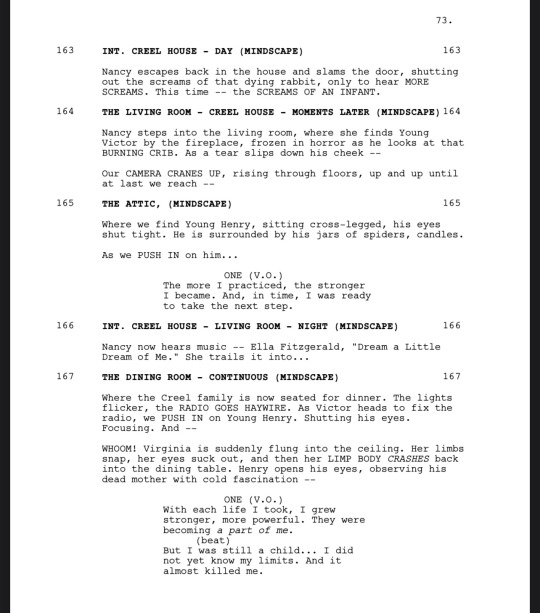
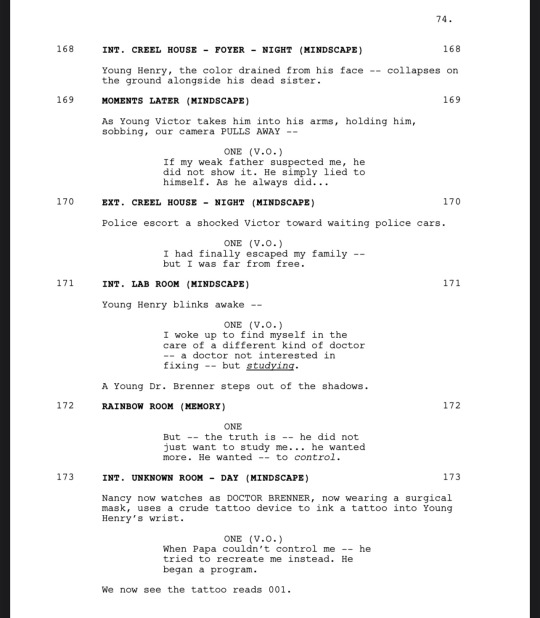
There are key, emphasized points in here that are essentially inverse-swapped from the final filmed product.
Final Filmed Product: - Heavy emphasis on Martin Brenner, sound effects and everything. - Brenner being placed at the center of the 1959 massacre by his involvement with the Creel mother. - Henward having been exposed to Brenner often enough to want to escape him before the 1959 massacre. - The Creel Mother despising Henward. - Henward was forced to kill because he was cornered in the situation with Brenner, - Barely any mention of Victor, but the mention we do have talks about a demon (which only appears in the Henry newspaper). - Strange, abrupt dialogue cut to Victor's arrest (i.e. "He was arrested..." with no clear mention to El of who "he" is). - Tattoo reads 00—
Script: - Brenner never mentioned to El by name by Henward - Brenner having no direct link to the 1959 massacre - No mention of the Creel Mother...at all. - Killing to escape his family framed as Henward's next logical step - Victor is focused on, his arrest is not mentioned, and neither is the demon. - Tattoo reads 001 right off the bat.
It's also so bizarre to me that even after the Henry-001 reveal in this script, he's never referred to as Henry. Henry is named in the flashbacks, but when it's NINA dialogue it's always One. One is never equated to Henry.
Even here:
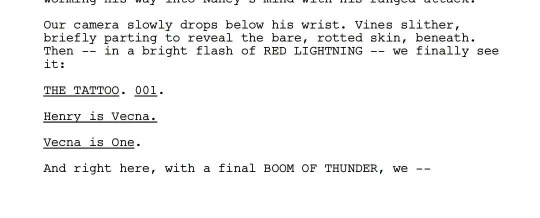
Never "Henry is One". Just "Henry is Vecna." and "One is Vecna."
We also have an entirely different transformation scene, one that would have more adequately tied Henward to Vecna without giving us that bizarre Brenner face overlay:

Which brings me to my final assertion: (Once again) There are two different Vecnas.
This would absolutely track with my observations about the mirror shards (here), the unaccounted for jumpsuits (here), the differences in build between Vecnas (here), and the Max/Maxine swapping (mentioned in script talk here, but it also appears in the final filmed product).
(And for heaven's sake, if you're thinking of coming into my reblogs with talk of revisions and unscripted changes: please don't. I have considered that, and I don't particularly care because there's a pattern to the changes.)
Script available here: link
#script analysis#4.07 script#henry creel#edward creel#henry/vecna/001#edward/vecna/001#stranger things#timeline theory
28 notes
·
View notes